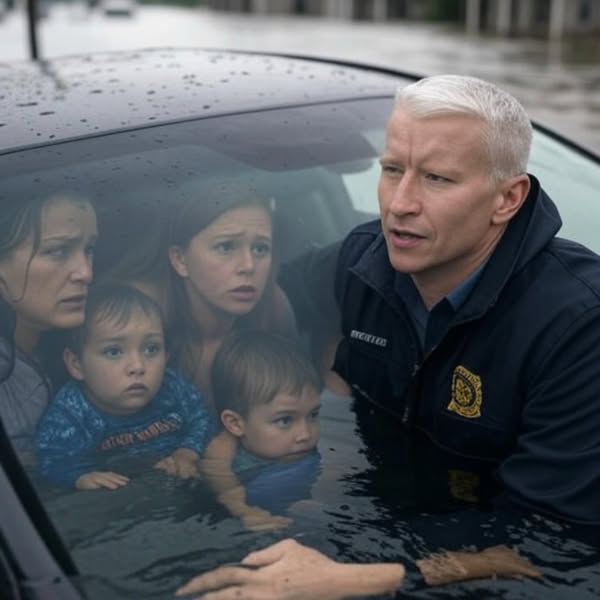Anderson Cooper Steps Beyond the Camera to Save a Family Trapped in Storm-Ravaged Louisiana
During a recent assignment in hurricane-stricken Louisiana, Anderson Cooper proved that journalism isn’t just about reporting from the sidelines—it’s about acting when lives are at stake. In a story that has gone viral for its quiet heroism, the CNN anchor helped rescue a mother and her two young children who were stranded in a partially flooded home.
The moment, which occurred off-camera during a live coverage break, is now being praised as a powerful display of compassion and courage from one of America’s most trusted journalists.
Storm Coverage Turns into a Life-Saving Mission
Cooper was on location in a heavily damaged district near Lake Charles, Louisiana, covering the aftermath of the recent hurricane that devastated the region. The report focused on the delayed arrival of federal relief teams and the overwhelming conditions faced by local communities.
After a segment ended and the cameras were turned off, Cooper noticed something unusual in a side street—an elderly house, half-submerged in murky water, where someone appeared to be signaling for help.
Without hesitation, Cooper and his CNN team paused their filming and rushed toward the scene. There, they found a mother and her two children, aged six and eight, who had been unable to evacuate due to road closures and lack of transportation.

No Time to Wait for Rescue
While rescue teams were active in other areas, the neighborhood Cooper was reporting from had yet to receive sufficient attention. Faced with rising floodwaters and the visible distress of the family, Cooper made a swift decision.
Using his team’s production vehicle and personal flotation gear that had been brought along for safety, he and two crew members escorted the family out of the flooded home, navigating through waist-deep water and debris-strewn streets.
Footage of the rescue does not exist—there were no rolling cameras, no spotlights, just an act of humanity in a moment of crisis.
Connecting the Family with Aid
After ensuring the family’s immediate safety, Cooper and his team did not stop there. He personally contacted the local Red Cross chapter, explaining the situation and arranging for emergency food, water, and temporary shelter for the displaced trio.
Within hours, the mother and children were relocated to a local relief center where they received medical checks, warm meals, and a safe place to sleep.
Red Cross officials later confirmed that Cooper’s quick actions may have prevented serious health risks, as the children had begun showing signs of dehydration and cold exposure.
Praise from the Public and Colleagues
Once word of the incident spread—initially through a post by a fellow crew member—it quickly went viral across social media. Viewers, colleagues, and members of the journalism community expressed deep admiration for Cooper’s actions.
CNN anchor Erin Burnett called the moment “a reminder of what it means to lead with both your head and your heart,” while longtime collaborator Sanjay Gupta said it was “classic Anderson—compassionate, fearless, and humble.”
On X (formerly Twitter), thousands used hashtags like #AndersonCooperHero and #HumanityInJournalism to share their appreciation and call attention to the family’s story.
Staying Quiet About the Heroism
When asked to comment, Cooper offered a characteristically modest response.
“I did what anyone would do,” he said in a follow-up interview. “This woman and her children were in trouble. We had the ability to help, so we did. That’s what matters.”
He declined to elaborate further, redirecting the focus to the broader situation in Louisiana and the many families still awaiting assistance.
A Reputation for More Than Headlines
Anderson Cooper is no stranger to reporting from the frontlines of crises. From war zones in the Middle East to earthquakes in Haiti, he has consistently placed himself at the heart of global emergencies. But it is this quiet, off-camera moment that may be among the most personal and impactful of his career.
“This isn’t about heroism,” one CNN staffer remarked anonymously. “It’s about being human. Anderson didn’t need the cameras to be rolling to do the right thing. That’s the kind of journalist—and person—he is.”
Renewed Conversation About Journalists as First Responders
Cooper’s actions have also reignited a conversation about the role journalists can play in disaster zones. While objectivity remains a cornerstone of journalism, many argue that there is space—if not a responsibility—for reporters to intervene in life-threatening situations.
Ethics experts note that Cooper’s actions align with a long-standing journalistic tradition of putting humanity above policy. “Journalists are witnesses, yes,” said media scholar Dr. Carla Stein. “But when someone’s life is in danger, being human comes first. Anderson Cooper demonstrated that with absolute clarity.”
Spotlight on Louisiana’s Ongoing Struggles
Beyond the viral story, Cooper has used the attention to emphasize the ongoing crisis in Louisiana. In subsequent broadcasts, he returned to the region to highlight gaps in aid distribution and to amplify the voices of local residents still waiting for help.
His reporting has since prompted several elected officials to call for faster emergency funding and improved communication between federal and state agencies.
From the Field to the Heart
In a media landscape often dominated by headlines and hot takes, Anderson Cooper’s recent actions serve as a poignant reminder of what journalism can be: a bridge between the powerless and the powerful, a vessel for truth, and sometimes, an instrument of rescue.
Whether delivering news from the anchor desk or pulling children from floodwaters, Cooper continues to embody the best of his profession—not just in what he reports, but in how he lives the values behind the news.






